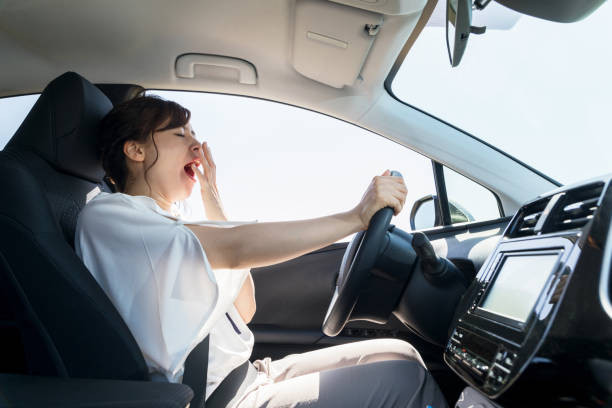What To Do if You Doze off While Driving
If you experience sudden sleepiness while driving or notice one of the other warning signs listed above, you should stop driving as quickly as possible. Pull into the next rest stop or any other safe, well-lit space that allows you to safely park and not obstruct the road. A 20-minute nap should leave you adequately refreshed and alert, but take more time if needed.
One thing to keep in mind is that coffee and other caffeinated beverages provide a temporary energy boost. After the effects of the caffeine have worn off, the feelings of drowsiness may return. A cup of coffee or two coupled with a brief roadside nap is recommended, but drinks to keep you awake while driving may not provide enough alertness on their own.
These measures should be seen as short-term interventions if you find yourself in a potentially dangerous situation. You can also reduce your risk of driving while drowsy by taking certain measures before you get behind the wheel.
Tip #1: Get Enough Sleep
Most adults between the ages of 18 and 64 should sleep seven to nine hours per day. People older than 65 may not need as much sleep, but the recommended daily allotment is still seven to eight hours. People who don’t receive seven hours of daily sleep are at higher risk of being involved in a drowsy driving accident.
Teenagers of driving age need about eight to 10 hours of daily sleep. Many teens do not meet this benchmark and will feel more tired behind the wheel as a result. If you have a child who drives, stress the importance of adequate sleep and the dangers of getting behind the wheel when tired or drowsy.
Tip #2: Avoid Alcohol if You Plan To Drive
Drinking and driving obviously pose safety risks to you, your passengers, and other motorists on the road. That said, even legal amounts of alcohol for operating a vehicle can cause drowsiness behind the wheel. You should be especially careful if you already feel tired.
The same is true of prescription and over-the-counter medications, particularly anti-allergy pills, that induce feelings of sleepiness. Be sure to check the side effects of any new medications before driving. If these effects include drowsiness, consider using public transportation instead.
Tip #3: Time Your Drives Around Peak Sleepiness Periods
Avoid driving in the late afternoon or between the hours of 12 am and 6 am, when the highest number of drowsiness-related accidents occur. If this is not possible, then be as vigilant as possible while you’re on the road. Watch for warning signs that you’re feeling drowsy, such as drifting across lanes or hitting rumble strips, and keep an eye on other drivers for the same behaviors.
Tip #4 Improve Your Sleep Hygiene
Sleep hygiene refers to habits and practices that help ensure an adequate amount of high-quality sleep each night. Practicing good sleep hygiene can help you feel more alert and well-rested in the morning. Key aspects of proper sleep hygiene include:
Consistent bedtimes: You should strive to go to sleep and wake up at the same time each day, including on the weekends and when you’re traveling.
Optimize your sleep space: The best bedroom for high-quality sleep is dark and quiet. Room temperature is also important. Many experts agree that 65 degrees Fahrenheit (18.3 degrees Celsius) is the ideal sleep temperature, but 60-67 degrees Fahrenheit (15.6-19.4 degrees Celsius) is a reasonable range for most people.
Keep portable electronics out of the bedroom: Cell phones, computers and tablets, and televisions all emit blue light that can interfere with sleep. You may use a blue-light screen that may be built-in into your phone/tablet to reduce it. As an added precaution, do not use any of these devices within 30 minutes of bedtime.
Avoid caffeine and alcohol before bed: Caffeine can disrupt your sleep, so it’s best to avoid caffeinated foods and drinks in the late afternoon or evening. Alcohol before bedtime can also cause sleep disruptions during the night. You may also want to avoid other fluids to cut down on nighttime trips to the bathroom.
Don’t stew in bed: If you’ve been lying in bed for 20 minutes or longer and still don’t feel ready for sleep, consider getting up and relocating to another area of your residence. Wait until you feel tired before returning to bed, and avoid blue-light electronic devices while you wait.
Practice healthy habits: Regular exercise during the day and a healthy diet can both improve your chances of a good night’s sleep.
Talk to a doctor if problems arise: Sleep problems may indicate insomnia or other sleep disorders. If you notice recurring patterns of poor or insufficient sleep, make an appointment with your doctor to discuss your symptoms.

